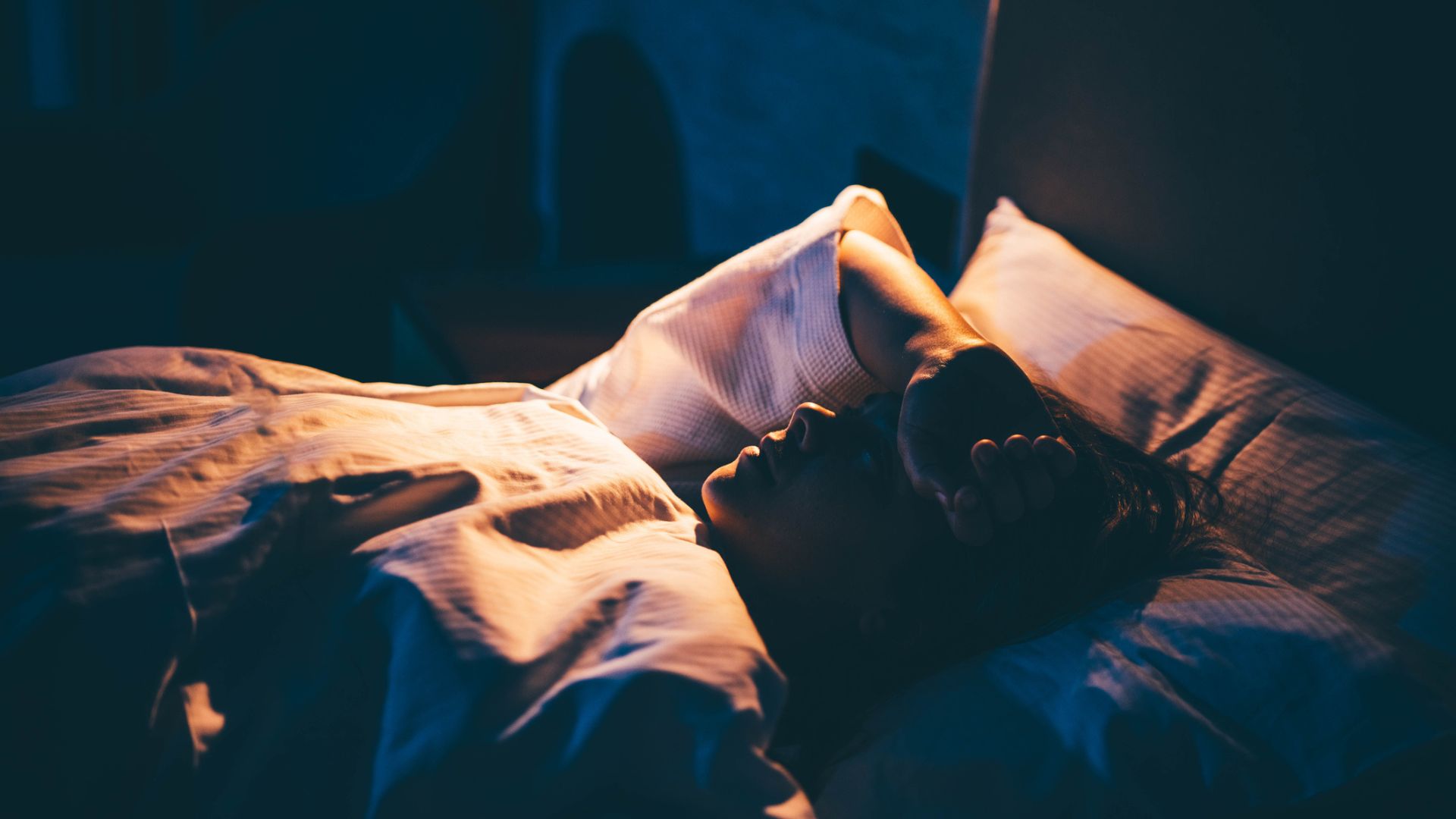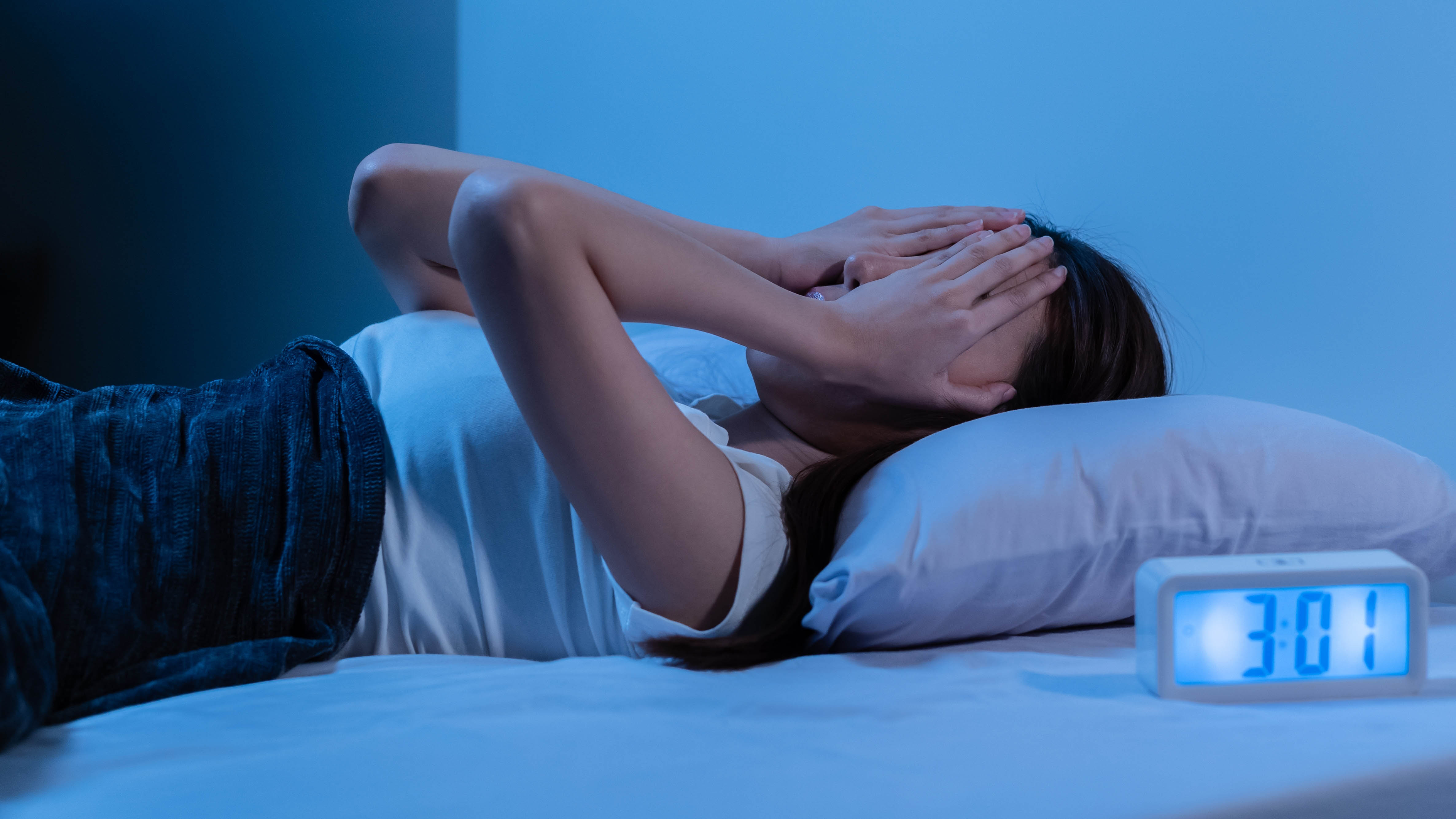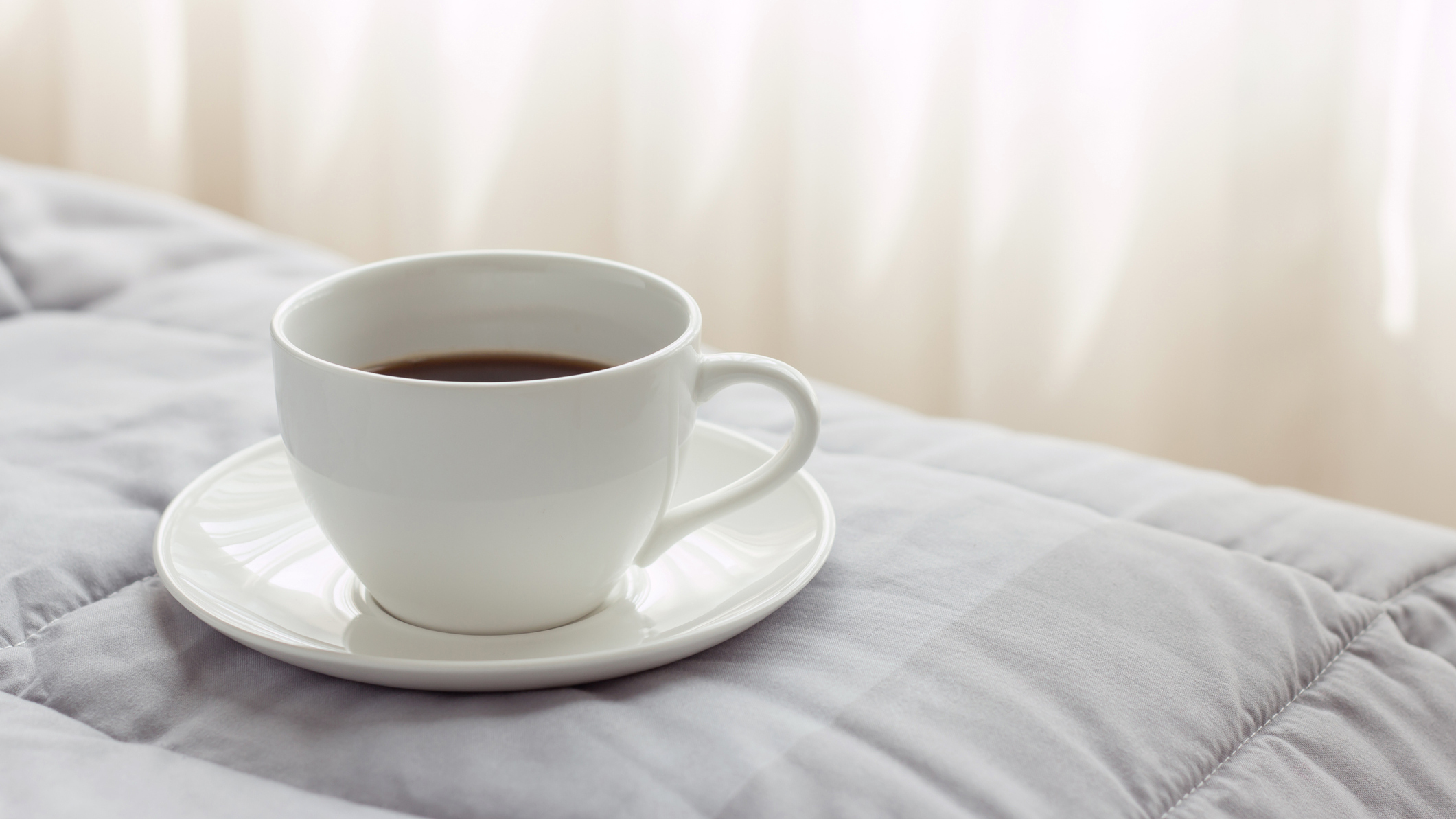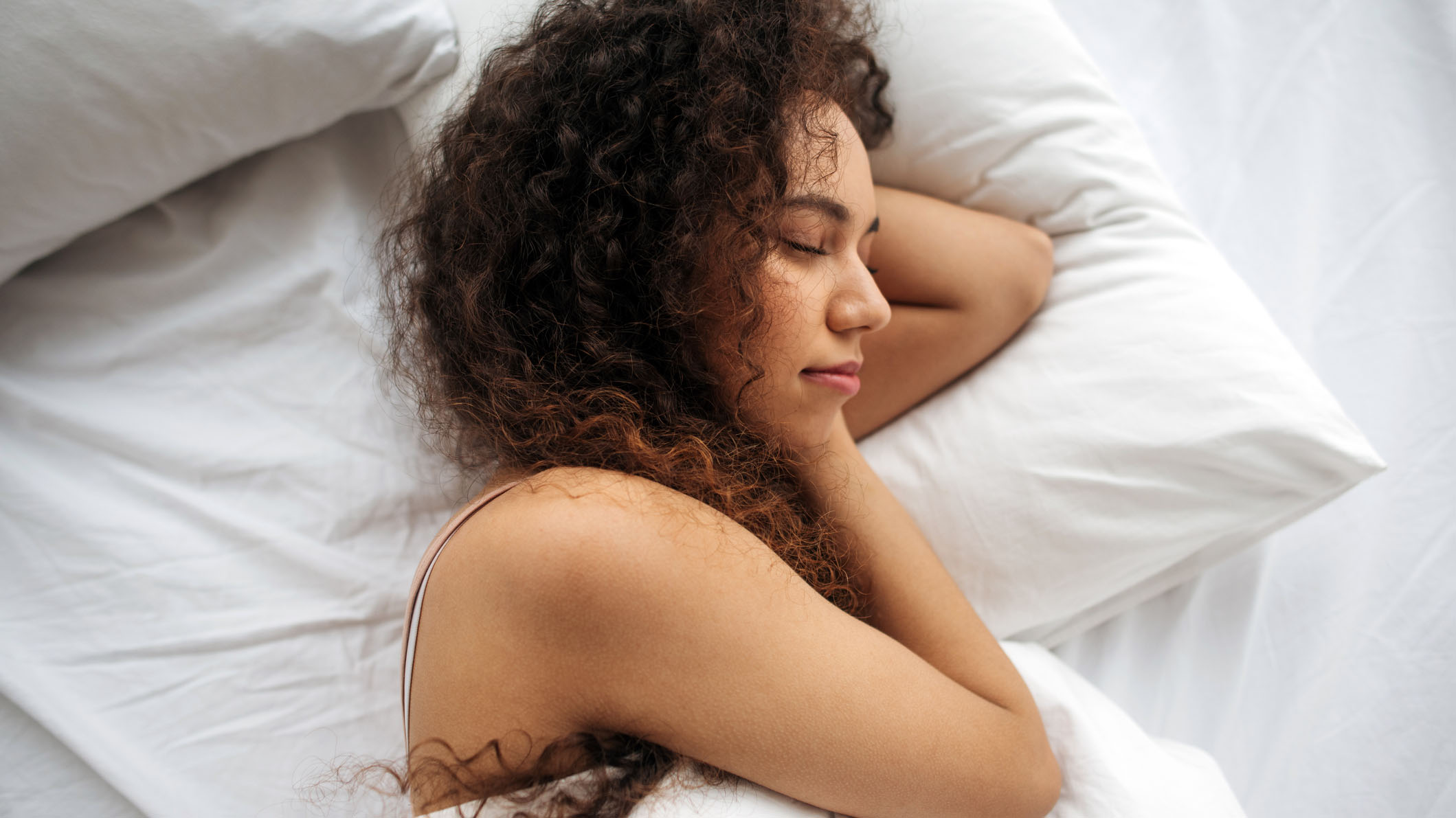How to calm anxiety at night naturally, according to a sleep doctor
Why your anxiety is worse at night and what you can do about it

We all suffer from mild sleep disturbances now and again. But if you’re finding it hard to fall asleep or get back to sleep more consistently due to whirring thoughts, you could be suffering from nighttime anxiety.
Knowing how to calm anxiety at night is the key to getting better sleep. However, it’s easy to create a cycle where anxiety causes sleep disturbances, and the lack of sleep then exacerbates anxiety, leading to a vicious cycle of poor sleep and heightened anxiety.
So, what is the key to calming anxiety naturally at night? We quiz sleep experts on natural remedies to ease the persistent and uncontrollable worries about work, relationships, health, or future events, that seem to get worse at night. Natural remedies include creating a comfortable sleep environment, practicing meditative breath work and journaling. Let's explore how to calm anxiety at night naturally.
What is nighttime anxiety?

If you’ve ever laid wide awake at night worrying about something, you could have experienced nighttime anxiety. Nighttime anxiety can also be connected to anxious thoughts about falling asleep.
Dr Hana Patel, resident sleep expert at Time4Sleep says it can be difficult to pin down the cause of sleep anxiety, as a wide variety of psychological and physiological reasons can heighten the issue.
Stress is, however, normally the main cause - and it could be down to persistent and uncontrollable worries about work, relationships, health, or future events, that get worse at night. These could bring on more physical responses such as a racing heart, shallow or rapid breathing, sweating, muscle tension, or a feeling of restlessness.
Dr Patel adds that some factors can heighten it: “Sleep anxiety is also a common accompaniment for those who already struggle with an anxiety-related disorder, as they tend to find it more difficult to quiet the mind.”
Get instant access to breaking news, the hottest reviews, great deals and helpful tips.
Why is anxiety often worse at night?
Sleep doctor Sophie Bostock explains that when we’re stressed we produce more of the hormone cortisol. “It is a very useful hormone for fuelling action. But before bed, it increases our levels of arousal, at a time when we need to relax.
“Stress therefore leads to a state of hyperarousal, where your brain and body are more alert than normal. It takes us longer to fall asleep, and because sleep is lighter, we’re more likely to be woken by noise, movement or changes in temperature.”
Dr Patel adds that it’s common for anxiety to be worse at night - as this may be the first time our bodies and minds have a chance to relax. She explains that: “the lack of these distractions at bedtime can make worries and anxieties feel more overwhelming.”
How to calm your nighttime anxiety naturally
You may be tempted to use medicinal sleep aids, which can help take the edge off of nighttime anxiety. However, there are also other ways to calm your nighttime anxiety naturally.
1. Practice box breathing
Box breathing, or any type of breath work, helps us to relax. “When we’re in danger, our breathing tends to get faster, as we prepare to fight or flee from a threat," explains says Dr Bostock, a sleep expert at Benson for Beds. "But occasionally, our breathing might pause completely: as we freeze, while we make up our minds. The same responses happen in moments of stress or anxiety,”
Dr Bostock adds that maintaining a slow, steady breathing rate, helps to signal to the brain that we’re not under threat and drive the relaxation response. “There are many different breathing techniques you can try, and it’s worth experimenting with a few different exercises until you find an approach which has a calming effect on you.”
This is how to practice box breathing:
- Breathe in while slowly counting to four
- Hold your breath for 4 seconds
- Slowly exhale through your mouth for 4 seconds
- Repeat steps 1 to 3 until you feel re-centered
2. Avoid caffeine 3-4 hours before bedtime

Whether your order is a triple shot latte or a tall frappe, drinking caffeine too close to your bedtime will not only affect your sleep but could also affect your anxiety levels. Caffeine affects the adenosine receptors in your brain, making it hard to promote sleep. One study in 2022 also showed how caffeine can cause anxiety and panic attacks.
“Aside from keeping us wide awake, caffeine can significantly augment feelings of anxiety, making you feel ‘on edge’,” explains Dr Patel. “This heightening of pre-existing worry is likely to make your sleep quality worse and contribute to a pattern of interrupted sleep.”
3. Focus on positive imagery
Many studies have shown that positive imagery can help to calm anxiety - which Dr Bostock believes can help at nighttime too.
The sleep expert advises: “Closing your eyes and picturing an event or place that makes you feel relaxed. This might be your favorite beach, mountain, lake, forest, or an imaginary place.
“Then ask yourself: What can you see? What can you feel? What can you smell? What can you touch?”
She explains that the main objective is that you’re just enjoying visualizing a happy place where you can feel calm and comfortable. “The more often you can return to this safe place in your mind, the more easily you’ll be able to relax and unwind, and eventually, it could help you to fall asleep.”
4. Perfect your sleep environment

Knowing you may be woken up by sound or light could increase your anxieties - so creating a sleep environment which makes you feel safe and comfortable is important.
“Whether that’s investing in blackout blinds or keeping the temperature regulated in your sleep space, finding out what sleep environment tweaks work best for you is really important," says Dr Patel. "This will not only prolong your rest and improve its quality but will also reduce anxiety around a lack of sleep you may have been suffering from which will be impacting your everyday routine."
This could also mean removing screens from your bedroom - including your phone and TV. “Dedicate your bedroom as a place that is just for sleep as screens of any form will cause a distraction and may heighten nighttime anxiety.”
If you are shopping for a new mattress or bedding to help improve your sleep, our guide to the best mattresses include top-rated recommendations that span budgets and sleep needs. Plus, with the Labor Day mattress sales in full swing, now is an excellent time to buy a new bed at a discounted price.
5. Jot down your worries in a journal
Writing down your feelings or worries can also help to ease your anxieties before you jump into bed. “Put aside 10-20 minutes for this exercise, perhaps at the end of the workday, or after dinner,” explains Dr Bostock.
“The aim is to stop unnecessary thoughts whirring around your head. If the same thoughts pop into your head when you’ve switched out the light, you can tell yourself that they are on the page, and you don’t need to think about them anymore.”
When to see a doctor
Dr Patel explains if lifestyle changes, such as changing your sleep environment or journaling aren’t curing your nighttime anxieties, you should book an appointment with your doctor.
“Certain periods in our life will naturally be more stress-inducing and may cause temporary sleep anxiety but if this is affecting your sleep for more than three nights a week over a few months, we’d consider this a medical issue that needs addressing,” she concludes.

Sarah is a freelance writer who has been published across titles including Woman & Home, The Independent, and the BBC. Sarah covers a variety of subjects, including health and wellness. For Tom's Guide Sarah often writes about sleep health and hygiene, and interviews leading sleep experts about common issues such as insomnia and sleep deprivation.
